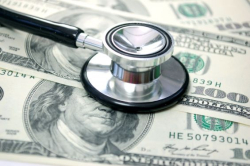If you incurred medical or dental expenses, you may be able to deduct them on your federal income tax return. You may also include medical expenses you paid for your spouse and/or a dependent. To do so you must itemize your deductions; so keeping receipts and good records is important as is knowing what qualifies as a deductible expense.
Qualified medical and dental expenses generally include the costs of:
- diagnosing, treating, easing and preventing disease
- prescription drugs and insulin
- insurance premiums for policies that cover medical care
- dental x-rays, extractions, dentures and teeth cleaning
- chiropractic and acupuncture treatments
- and much more!
 Equipment and property improvements that are medically necessary may also be deducted. This would include the cost of updates like installing railings and support bars, porch lifts, and widening doorways to address medical care needs. However, the deductible amount of the capital improvement costs may be reduced if it increases the value of your property. The allowable deduction would be reduced by the increase in the value of your property.
Equipment and property improvements that are medically necessary may also be deducted. This would include the cost of updates like installing railings and support bars, porch lifts, and widening doorways to address medical care needs. However, the deductible amount of the capital improvement costs may be reduced if it increases the value of your property. The allowable deduction would be reduced by the increase in the value of your property.
Even travel costs specifically related to medical care may be deducted; including public transportation, ambulance service, tolls and parking fees. Personal vehicle mileage used for qualified medical care travel may be deducted using the standard medical travel mileage rate which is 19 cents per mile for 2016, or the actual travel costs may be deducted.
Costs that have been reimbursed by insurance and other sources do not qualify for a deduction. You also may not claim a tax deduction for medical expenses that were paid from a Health Savings Account or Flexible Spending Arrangement, as those payments are made from pre-tax dollars and would be considered a double benefit.
Generally, you can deduct only the amount of your medical and dental expenses that is more than 10% of your Adjusted Gross Income (AGI). But if either you or your spouse was born before January 2, 1952, you can deduct the amount of your medical and dental expenses that is more than 7.5% of your AGI.
To find out more about allowable qualified medical and dental expense deductions, click here for the tax information guide. If you have questions, please contact one of our tax preparation specialists at McRuer CPAs for more information.
 is now
is now 
